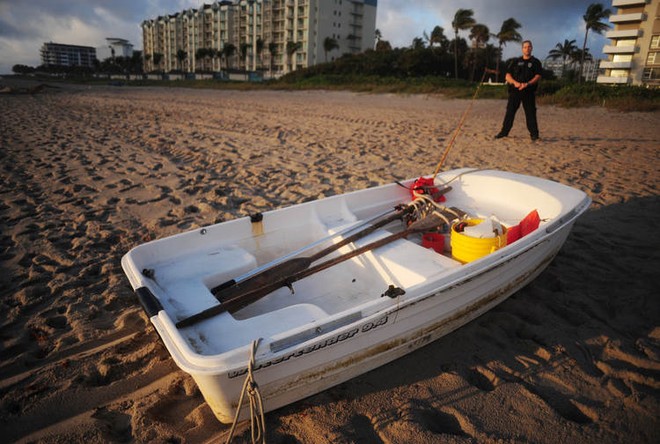Three days rowing after yacht sinks - survivors tell their story
by Sun Sentinel/Sail-World Cruising on 16 Nov 2011

This is the boat that the two rowed for three days to reach shore, Tuesday, Nov. 15, 2011. Photo by Joe Cavaretta, Sun Sentinel SW
Have you ever had nightmares about what you would do if your boat hit an unknown object mid-ocean and sank suddenly? What if your radios were flooded, your EPIRB didn't work, you couldn't reach your liferaft and you ended up in your dinghy?
It's happened to two men who lived to tell the tale, and what a gripping story it is. They rowed for three days to reach shore, which they did at Boca Raton on the Florida coastline, just north of Fort Lauderdale.
How did they do it? What kept them going? 'Keep moving!' Mike Ayres told Jerome Burdi and Peter Franceschina of the Sun Sentine, after the incident, 'It's like those survivor stories. Don't stop. If you stop, you're done.'
It took three days, but they finally made it, landing ashore on a Boca Raton beach about 6:20 a.m. Tuesday, after leaving Islamorada in the Florida Keys on their yacht Saturday afternoon.
Ayres, 46, an Islamorada snowbird who lives near Detroit, and Steffon Moore, 19, of Miami Gardens, a hired deckhand, were making the 85-nautical-mile trip to Bimini in the Bahamas to pick up a dive tank compressor.
But about five hours into their passage, the quick trip turned into a life-or-death journey. Their 41-foot yacht Lady Rosalee, capsized and sank in heavy seas 12 miles south of Gun Cay in the Bahamas, authorities said.
The Coast Guard was never notified of the sinking, so no search was launched, Petty Officer Sabrina Elgammal said.
Interviewed bedside in Boca Raton Regional Hospital, where he was recovering from hypothermia and dehydration, Ayres said he spent a month and a half working on the yacht before the trip.
'It was immaculate,' he said. 'You could probably go around the world with it, except as we learned you've got to be careful.'
A massive thump:
Underway at about 5 p.m. Saturday, the men heard a massive thump on the side of the hull. Ayres, a lumberjack, doesn't know what he hit, but it caused the sea to come rushing into the yacht, in a spot about 1,400 deep.
'We did everything we could to save it,' a sunburned and exhausted Ayres said. They bailed furiously, but soon the boat's batteries flooded, leaving the men without an engine or radio. Preparing for the inevitable, they dropped the dinghy into the ocean and loaded it with survival gear — oars, flares, two gallons of fresh water, a bucket of equipment, chocolate chip cookies and crackers.
Then they jumped in and Ayres started to row – for days. 'It was one series of bad events after another,' he said.
Running through his mind was the fatal Gulf of Mexico fishing trip that killed Oakland Raiders linebacker Marquis Cooper, free-agent NFL defensive lineman Corey Smith and former University of South Florida player William Bleakley in February 2009, after hypothermia set in.
To fend off the cold, Ayres and Moore told the Sun Sentinel they tore open their life jackets and wrapped themselves in the filling to maintain their body heat being sapped by the strong winds and 15-foot waves. They began to hallucinate, Ayres said, seeing buildings and animals in the middle of the open ocean.
Yet Ayres kept his bearings, navigating by the stars. Each time he spotted another boat, he fired off flares, a total of 16, but no one spotted them. Hopes of rescue faded – but they kept moving.
'It was like a perfect storm of not being able to get a boat to help us,' Ayres said.
By Monday night, Ayres knew they were just 2 miles off Miami Beach, not too far from the Government Cut shipping channel. He said they could see the tantalizing contours of the South Beach skyline with its shimmering hotel lights.
But their problems weren't over yet. A powerful wind, apparently the remnants of Tropical Storm Sean, relentlessly pushed them north.
It wasn't until early Tuesday that Ayres could overcome the winds and waves to safely navigate the dinghy westward and to shore.
They finally beached their boat in the 700 block of South Ocean Boulevard. Aboard the small fiberglass Watertender were two life jackets, a life preserver, a fishing pole and a five-gallon bucket.
Ayres' mother, Joyce, reached by phone in Cedarville, Mich., said she was relieved that her son made it. If anyone could have done it, it would be him, she said.
When you're at sea, you have to be prepared for the unexpected, Mike Ayres said.
'This would have killed a lot of people, and quickly,' he said. 'I tend to keep my head, and being out in the wide blue ocean, you have to.'
Best news comes from the www.sun-sentinel.com!Sun_Sentinel
If you want to link to this article then please use this URL: www.sail-world.com/90789